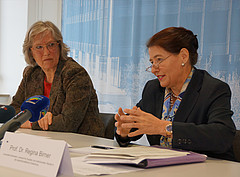Development Experts Demand:
No tuition fees for students from developing countries [19.04.17]
Over 50 renowned experts from science and development politics have signed the Declaration against Tuition Fees for Foreigners from Outside the EU
Support sustainable development, relieve poverty, fight causes of flight: All of these are made possible for students from developing countries by studying in Germany. But for many of them, the tuition fees of over 1500 euros per semester for non-EU foreigners as planned by the state government could pose an insurmountable obstacle. At a state press conference on Wednesday, experts in development cooperation thus made a joint declaration against the planned tuition fees.
The over 50 supporters of the declaration call for the government to stop its plans to introduce tuition fees for non-EU foreigners in Baden-Württemberg or that it at least make exceptions for students from developing countries.
“Unfortunately, the exceptions that have been planned thus far are not enough because they only include a very small portion of the affected students,” explains the initiator, Claudia Duppel, Managing Director of the Dachverband Entwicklungspolitik Baden-Württemberg e.V. She believes the opportunity to obtain a high-quality and yet affordable education in Germany is an important part of development cooperation.
“By educating students from developing countries, the universities in Baden-Württemberg provide an important contribution to fighting poverty and promoting sustainable development - they thereby also contribute to fighting the causes of flight,” confirms co-initiator Prof. Dr. Regina Birner, Director of the Department of Social and Institutional Change in Agricultural Development and Assistant Director of the Institute of Agricultural Sciences in the Tropics at the University of Hohenheim.
Education as a Development Goal Worthy of Protection
After finishing their studies, students from developing countries make significant contributions to solving development-related problems in their home countries as experts and managers, as they often take on key positions in public administration, universities, and development cooperation projects or in the private sector, explains Prof. Dr. Birner. That is why the signatories of the Declaration also include the heads of environment-focused degree programs in Baden-Württemberg that offer education opportunities for students from developing countries, for example in the areas of renewable energies, sustainable urban development, and ecological agriculture.
“This expertise is particularly relevant for students from developing countries since environmental problems often pose serious challenges to sustainable development,” elucidates Prof. Dr. Birner. “The planned tuition fees, however, would make it difficult for many people from developing countries to access this kind of degree program, which is so relevant to development.”
Not least, the planned tuition fees contradict the goals of the United Nations for sustainable development, one of which is access to high-quality education. “The state government of Baden-Württemberg has professed its commitment to this development-political responsibility,” reminds the scientist.
In addition, the investment in foreign students is not a one-way street. After completing their studies in Germany, the students later support the economic, scientific, and cultural cooperation with Germany in their home countries.
Tuition Fees Hinder Development Cooperation
The intended introduction of tuition fees will also have effects beyond the universities, emphasizes the second expert behind the Declaration, Claudia Duppel, the Managing Director of the Dachverband Entwicklungspolitik Baden-Württemberg e.V: “Tuition fees for foreign students are an especially problematic signal at a time in which an increasing number of states are pushing forward with isolationist policies aiming at exclusion.”
The tuition fees are untenable from a social perspective, as well, especially because only 20 percent of the income from tuition fees is to go to the universities while the other 80 percent would go to the general state budget. “Why, in one of the wealthiest industrial countries in the world, students from developing countries should be expected to finance the general budget, is very difficult to understand,” says the expert for development policy.
Experts and Institutions Support the Demand
Over 50 supporters have signed the Declaration so far. They are active across the state and nation in the areas of development research, development cooperation, and education for sustainable development.
They include the directors of leading institutes for development research in Germany such as Prof. Dr. Joachim von Braun, Director of the Center for Development Research (ZEF) in Bonn, Prof. Dr. Andreas Mehler, Director of the Arnol-Bergstraesser-Institute (ABI) in Freiburg, and Dr. Imme Scholz, Assistant Director of the German Development Institute (DIE) in Bonn. Signatories also include representatives of well-known civil society organizations who work in the area of development cooperation, including Dr. Till Wahnbaeck, Secretary General of the Welthungerhilfe, and Dr. habil. Klaus Seitz, Director of the Policy Department at Bread for the World.
Text: Barsch / Klebs
Contact for press:
Prof. Dr. Regina Birner, University of Hohenheim, Director of the Department of Social and Institutional Change in Agricultural Development
T +49 (0)711 459 23517, E Regina.Birner@uni-hohenheim.de
Claudia Duppel, Dachverband Entwicklungspolitik Baden-Württemberg e.V. (DEAB), Managing Director
T +49 (0)711 66487360, E claudia.duppel@deab.de


